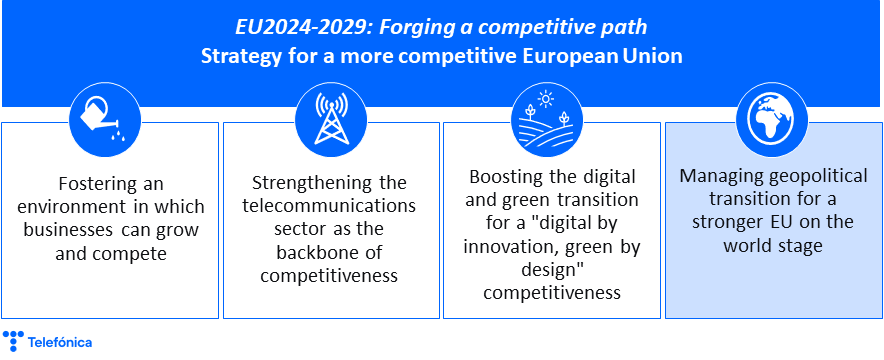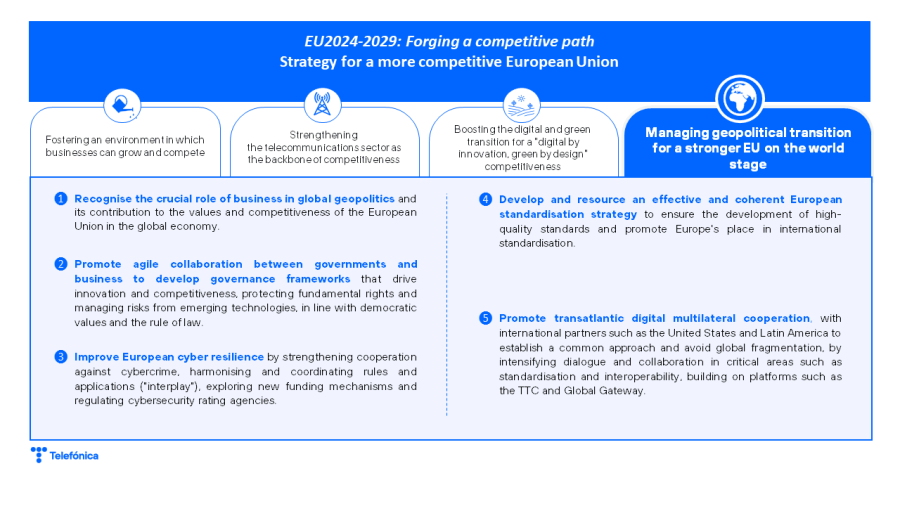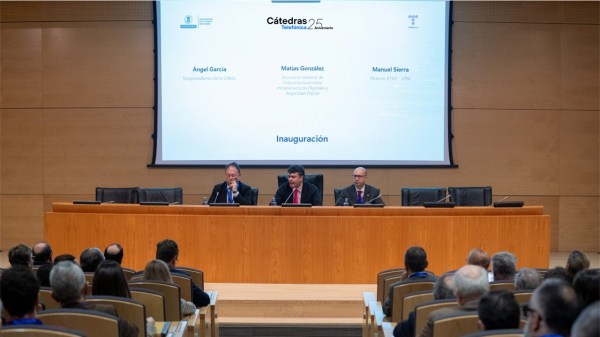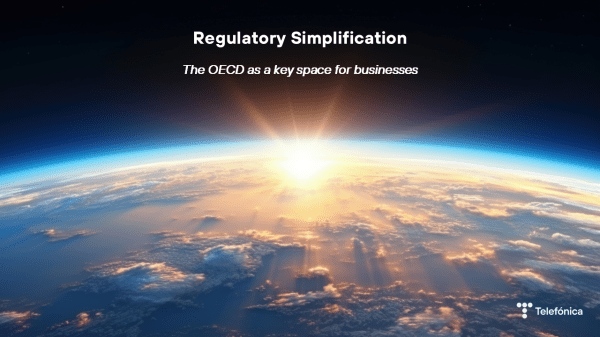In June, we began a series entitled EU 2024-2029: Boosting competitiveness where we analyse Telefónica’s vision on how to strengthen competitiveness and better position the society and economy of the European Union (EU) on the global stage. This series coincides with the start of the institutional cycle that runs from 2024 to 2029 after the European Parliament elections. Undoubtedly, competitiveness will be the central priority guiding the EU’s forthcoming policy and legislative initiatives in this period.
The first post analysed the current state of EU competitiveness, the second looked at the first axis of Telefónica’s proposed competitiveness strategy and the third focused on the second strategic axis, the importance of strengthening the telecommunications sector as a lever for society’s competitiveness. The fourth and fifth posts analysed how to drive the digital and green transitions, respectively.
In this sixth post we address the last strategic axis “Managing geopolitical transition for a stronger EU on the world stage”.

The role of telco companies in geopolitics
Geopolitics and the importance of technological leadership are intertwined in today’s global scenario and are a fundamental element of this new geopolitical transition.
Technology companies have emerged as key geopolitical actors in the new international order, extending their influence extraterritorially beyond their national borders. Their influence has economic, cultural and digital governance implications. Their participation is key to the implementation of digital regulations, just as the adoption of codes of conduct as a self-regulatory mechanism is now a fundamental element in protecting the rights and security of individuals. The accumulation of data, the development of algorithms and the construction of global digital infrastructures give them unprecedented influence on world markets and public opinion, turning their economic power into geopolitical influence.
The advent of Artificial Intelligence has also made the establishment of reliable and effective international cooperation mechanisms to ensure digital trust and confidence an exercise of paramount responsibility.
In this evolving world where technology plays a leading geopolitical role, the EU must recognise the growing importance of companies. They are key actors in promoting European values on a global scale and in creating economic value in a competitive environment. Cooperation between governments and companies is essential to develop agile governance frameworks that foster innovation and competitiveness, while protecting fundamental rights and mitigating the risks associated with emerging technologies, in line with democratic values and the rule of law.
Divergent approaches: The US and the EU
The US and the EU have divergent approaches to telco companies due to their different values, legal traditions, political priorities and technological leadership. In the US, a minimal government intervention approach prevails, which has allowed technology companies to innovate and thrive.
Instead, the EU has adopted regulation to address the excesses of mostly non-European tech companies and protect consumer rights. Initiatives such as the General Data Protection Regulation (GDPR), the Digital Services Act, the Digital Markets Act or the Artificial Intelligence Act seek to establish comprehensive framework for the protection of individual rights, the rule of law and democracy, as well as measures against monopolistic and anti-competitive practices.
However, the US and the EU face common challenges in managing the complex interplay between technology and geopolitics. The common values that exist between the two blocs must be built upon, while fully respecting existing differences, in order to address common challenges. The rapid pace of technological progress is outpacing the ability of traditional governance structures to adapt and respond effectively. It is therefore crucial to deepen European digital sovereignty, strengthen cooperation against cybercrime, and harmonise and coordinate regulation and implementation.
Leadership in standards and evolution towards 6G
On the other hand, standardisation has become a key element to technically underpin new technological proposals for the future and foster innovation, avoiding the fragmentation caused by different regional or national requirements and facilitating the resilience of global value chains. For this reason, leadership in technological standards has great potential, and Europe is lagging behind other regions such as the United States or China, which provide resources and create specialised bodies, as is the case of the National Institute of Standards and Technology (NIST).
It is essential to develop and resource an effective and coherent European standardisation strategy that ensures the development of high-quality standards and promotes Europe’s place in international standardisation.
Avoiding fragmentation at the global level and fostering Transatlantic Cooperation
In an increasingly interconnected and polarised world, it is crucial to avoid fragmentation in the regulation and governance of emerging technologies, particularly at the technology level. Fragmentation can significantly hamper growth and innovation by creating artificial barriers between markets and technologies, slowing the flow of ideas, resources and talent.
In this context, the EU-US Trade and Technology Council (TTC) provides a strategic platform to foster transatlantic cooperation on trade, policy and technology issues. At the same time, the TTC can play a significant role in strengthening ties between EU and US companies to address common challenges and explore opportunities for cooperation.
Fostering transatlantic multilateral digital cooperation is essential to avoid global fragmentation and strengthen transatlantic cooperation in the regulation of emerging technologies. The EU should work with like-minded partners, such as the US and Latin America, to establish a common approach and intensify dialogue and cooperation in critical areas such as standardisation and interoperability, building on platforms such as the TTC and Global Gateway.
Public policies to foster public-private cooperation on a global scale
Avoiding global fragmentation and promoting transatlantic cooperation are therefore key challenges in the digital age. The EU must strengthen cooperation with the private sector and work towards a common approach to the regulation and governance of emerging technologies, for the benefit of European citizens and businesses.
Digital economic diplomacy should be promoted to strengthen transatlantic cooperation on the regulation of emerging technologies and to ensure that the benefits of technological innovation are shared equitably, while mitigating risks and protecting fundamental rights.
In conclusion, geopolitical transition is a challenge that requires a strategic and coordinated EU response based on international cooperation, technological leadership and the defence of fundamental values.

In the next post we will delve deeper into defence and cybersecurity to improve Europe’s resilience and future competitiveness.







